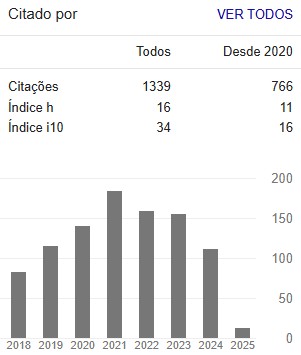EXPOSIÇÃO PÓS-NATAL A POLUENTES DO AR (MP≤2,5) COMO FATOR DE RISCO PARA O DESENVOLVIMENTO DE COMPORTAMENTOS DE DEPRESSÃO E ANSIEDADE: UM ESTUDO EXPERIMENTAL
Resumo
O objetivo do estudo foi avaliar as alterações comportamentais de ratos machos e fêmeas adultos, expostos ao material particulado fino e ultrafino (MP≤2,5) suspenso na poluição do ar, durante o desenvolvimento. Ratos Wistar com idade de 7 dias pós-natal, foram expostos à câmara de um concentrador de partículas atmosféricas. Foram realizados os testes de campo aberto e teste de preferência por sacarose para avaliação da presença de comportamentos de ansiedade e depressão. Ratos machos do grupo poluição apresentaram redução da atividade locomotora e do tempo de permanência no centro do campo aberto quando comparados aos machos do grupo controle. O teste de preferência por sacarose evidenciou significância estatística entre os grupos poluição e controle, e entre os machos do grupo poluição e controle. O estudo concluiu que a exposição ao MP≤2,5 causa alterações comportamentais características de depressão e ansiedade, em ratos machos adultos expostos durante o período de desenvolvimento.
Downloads
Downloads
Publicado
Edição
Seção
Licença
Os artigos submetidos à revista Colloquium Vitae estão licenciados conforme CC BY-NC-ND. Para mais informações sobre essa forma de Licenciamento, consulte: http://creativecommons.org/licenses/by-nc-nd/4.0/.
A disponibilização é gratuita na Internet, para que os usuários possam ler, fazer download, copiar, distribuir, imprimir, pesquisar ou referenciar o texto integral dos documentos, processá-los para indexação, utilizá-los como dados de entrada de programas para softwares, ou usá-los para qualquer outro propósito legal, sem barreira financeira, legal ou técnica.

